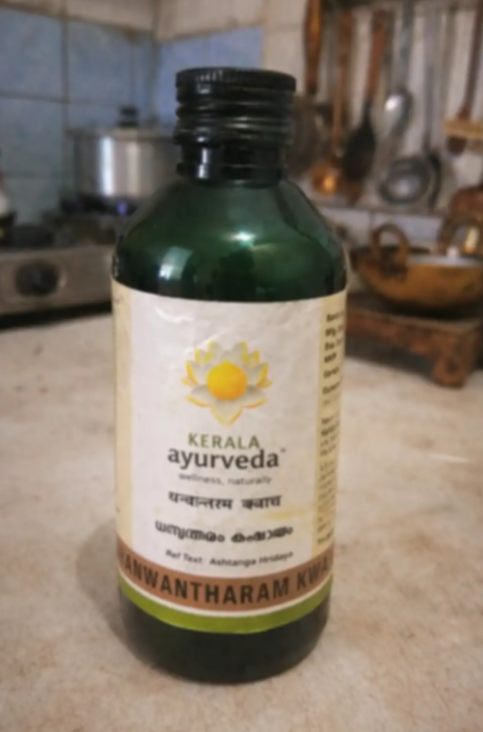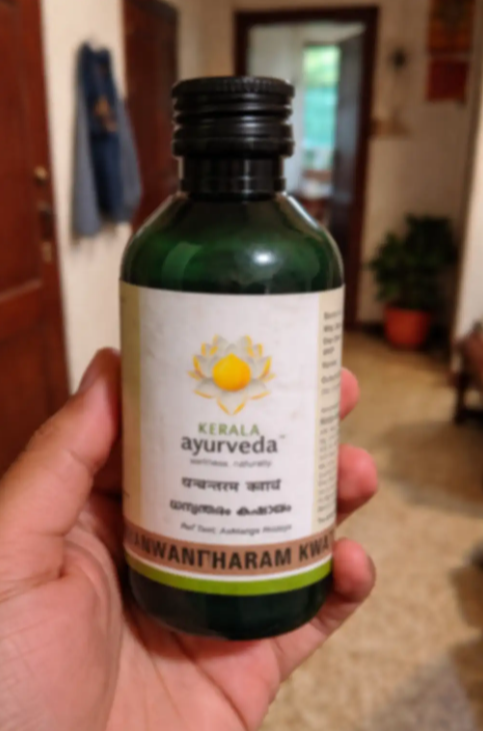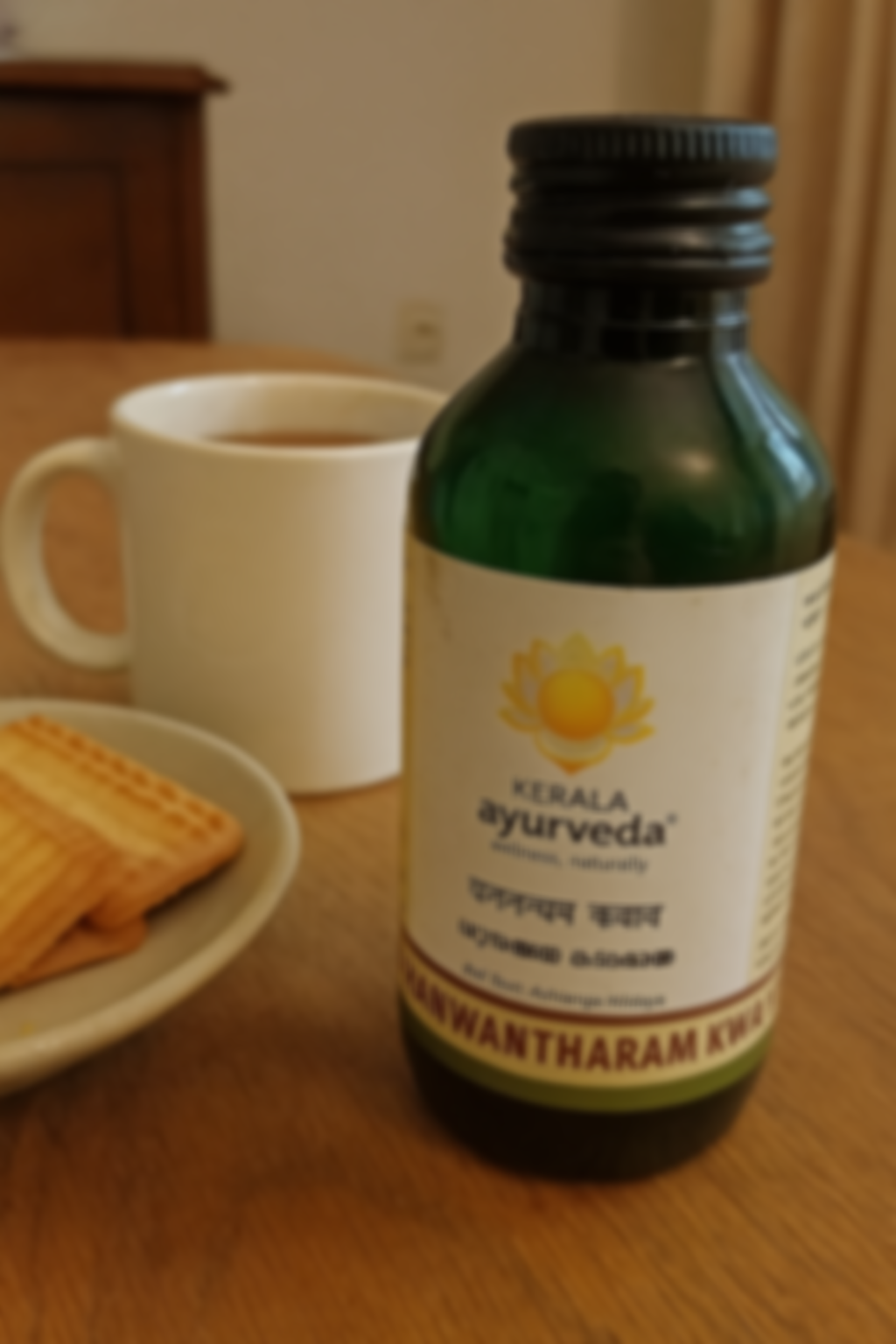Key Benefits of Kerala Ayurveda Dhanwantharam Kwath
- Helps balance Vata dosha, reducing stiffness and joint discomfort
- Supports postnatal recovery, restoring natural vigor after childbirth
- Aids in relief from muscle wasting and numbness in limbs
- Eases symptoms of rheumatic and degenerative conditions
- Soothes body aches and helps maintain healthy tissue tone
- Contributes to better urinary and vaginal health post-delivery
- Promotes gentle overall rejuvenation and well-being
Product Description of Kerala Ayurveda Dhanwantharam Kwath
Kerala Ayurveda Dhanwantharam Kwath is a time-honored herbal decoction crafted to support the body’s natural healing processes, especially post childbirth. In my experience, it’s like a warm hug from the inside—steeped in tradition, yet surprisingly grounded in day-to-day life. This Kwath is formulated to pacify Vata dosha which often goes haywire after delivery or injury, leading to stiffness, muscle wasting or that endless sense of numbness in the joints. It gently cradles the body, lending strength to tissues and muscles and it calms rheumatic complaints arising from trauma or degeneration.
And you know what? Sometimes I wonder why we lose touch with such simple remedies. This decoction comes from the heritage of Kerala’s ancient texts, brewed carefully to extract the essence of herbs that have soothed generations of mothers and warriors alike. Whether you’ve just welcomed a newborn, or you’re navigating chronic aches, a small cup of Dhanwantharam Kwath can feel surprisingly supportive. It doesn’t promise miraculous cures—rather it’s about steady, subtle relief and a reminder that healing can be nurturing, slow and kind.
Key ingredients with descriptions of Kerala Ayurveda Dhanwantharam Kwath
- Bala (Sida cordifolia): Traditionally used in Ayurveda to strengthen muscles and bones, supporting overall tissue health.
- Kulattha (Dolichos biflorus): Known for its warming properties, it’s often employed to stabilize Vata and ease muscular stiffness.
- Dasamoolam: A classical blend of ten roots used to balance the three doshas, especially effective for Vata-related imbalances.
Key uses of Kerala Ayurveda Dhanwantharam Kwath
- Postnatal support: Helps new mothers regain strength and reduce post-delivery discomfort
- Vata disorders: Addresses joint pain, numbness, muscle wasting due to Vata imbalance
- Rheumatic complaints: Alleviates aches from degenerative or traumatic conditions
- Body aches: Offers general relief in cases of chronic or acute muscular pain
- Vaginal and urinary health: Soothes discomfort in painful micturition and related issues
- Rejuvenation therapy: Complements Panchakarma and other purification treatments
How to use Kerala Ayurveda Dhanwantharam Kwath
Take 15 ml of Dhanwantharam Kwath and dilute it in 60 ml of boiled, cooled water. Drink this twice daily, preferably before meals. Stir well and sip slowly to fully absorb the herbal essence. Or follow your physician's recommendation for dosage variations.
Safety information about Kerala Ayurveda Dhanwantharam Kwath
- Children: Not recommended for children under 12 without professional guidance.
- Pregnant women: Use only under the supervision of an Ayurvedic practitioner.
- Breastfeeding mothers: Consult your healthcare provider before use.
- People with chronic diseases: Seek advice from a qualified doctor, especially if you have heart or kidney issues.
- People with allergies: Check ingredient list carefully; discontinue if any allergic reactions occur.
- Elderly individuals: Start with half the dose to assess tolerance, then adjust gradually.
- Patients taking medications: May interact with blood thinners or antihypertensives; consult a professional.
- People with weakened immunity: Use cautiously and under medical supervision to avoid unexpected effects.
Additional information about Kerala Ayurveda Dhanwantharam Kwath
Store this herbal decoction in a cool, dry place away from direct sunlight to preserve its potent qualities. Shake well before use since natural sediments may form at the bottom—this is completely normal and indicates authentic preparation. The color may vary slightly between batches, reflecting seasonal changes in the herbs. Each batch is crafted in small lots following the rigorous standards of Kerala Ayurveda, free from synthetic additives. If you find the taste a bit strong, you can add a sprinkle of jaggery or a few drops of honey after cooling—this wont alter the efficacy but does make it more palatable. Always read the label carefully and follow the storage and usage guidelines for optimal results.



